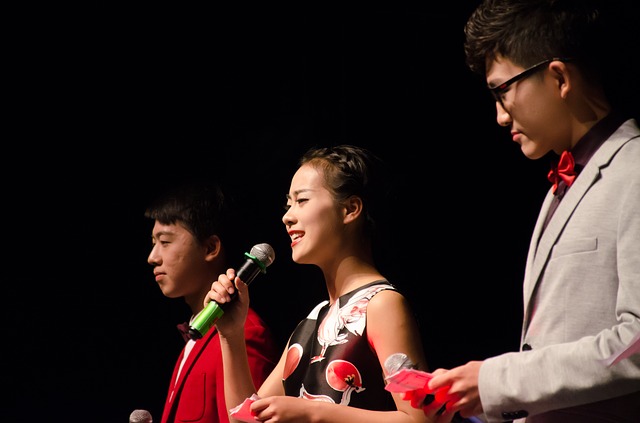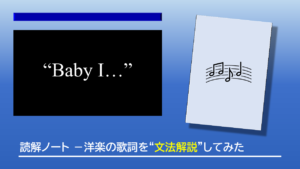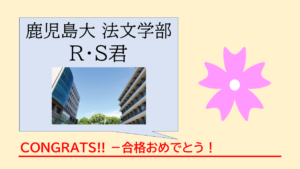さて,仕上げに入ります。生徒本人から出してもらったインパクトのあるエピソードで肉付けが済んだ原稿に,飾り付けをしていきます。
(1) Introduction
“What meaning does your name have?” An international student from Cambodia had asked me during an English activity class. I was in elementary school at that time. I looked into his eyes, smiled, and said, “pink…spring…beautiful!” all the while my hands were fluttering like falling blossoms. Even though I didn’t know the English words for “cherry blossom” or “national flower,” he somehow understood what I had wanted to say.
What do you think is most important for communication? A positive attitude? A warm welcoming smile? Having a good heart? Some people say, “To communicate, we only need a strong heart. Without it, it would be useless to learn numerous English words and difficult grammar at school.” Of course, all these things are important: a good attitude, smiling and having a good heart.…I think I have them. However, during this summer vacation, I learned exactly what really is most important for communication.
冒頭で聴衆を一気に惹きつける「ツカミ」を加えました。本人が実際に経験したことなので説得力がありますね。
(2) Body1
I went on an international tour to New York. I wanted to use English in real everyday life situations, because I had studied English very hard ever since I entered junior high school. I recited all the sentences in the textbooks, took online conversation lessons every day, wrote my diary in English, and watched many American TV shows. I also always received good grades on the term exams.
(3) Body2
The members of the tour were indeed very international. There was an Australian couple, a Philippine family, a German lady, families from Hong Kong and Israel. From visiting the Niagara falls to having dinner together, I greatly enjoyed our many conversations. We talked about our families, our countries, Taylor Swift, and so much more. They all spoke English well and my English worked, but that was up until we went to the Metropolitan Museum.
もともと2つだった段落を統合しました。より緊張感を持たせるため,段落の最後に次の段落の冒頭のセンテンスをもってきました。
(4) Body3
“Can you see something different in the statues in this room from those you saw in the last room?” Our guide asked in the Greek art section. And with all the joy in the world, I wanted to shout out, “Contrapposto! Something I learned in art class, a sophisticated asymmetry composition in which the person’s weight is on either leg.” One by one, all the other international students around my age were raising their hands and expressing themselves with such confidence. But what I really wanted to say, I could only do so in Japanese. I was unable to express myself in English. I was the only student who remained silent in the group. I was so shocked. There was something lacking in my English ability.
臨場感を出すために,直接話法を使って美術館でのエピソードを丁寧に描写しました。この段落を口頭で効果的に伝えるには高度なスピーチ技術が必要です。練習にはかなりの時間をかけました。
(5) Conclision
When we see beautiful scenery or have something delicious, we can certainly smile and just say “very good!” and we share our feelings. However, that is only one part of communication. We need to learn English more academically in order to be able to express ourselves clearly, especially in public. Difficult words and grammar are not just for grades in our school tests, but they are essential for complete and meaningful communication.
I won’t be satisfied with just everyday conversations. I want to go beyond an ordinary conversation. I want to talk about art, literature, history and social problems with people from all over the world. I want to discuss, share my opinion, persuade people and to negotiate, instead of just asking the way to the station.
As I wish to fulfill these objectives, I will continue to study English. And the next time I visit the Metropolitan Museum, I will be the first to raise my hand in answering our guide’s question. And I will express myself in English, Thank you.
最後の印象的なオチ(下線部)をつけて完成です。
いかがでしたか。今回はスピーチもライティングも初心者の生徒だったので,まず自由なネタ出しから始めて,それをスピーチ原稿の形に加工していくという方法を採りました。
ですが,基本的にエッセイライティングやスピーチ原稿を書くときは,最初に問題-解決(主張) – 理由 – 根拠(具体例)の骨組みをしっかりと作ってから,次に肉付け,スピーチの場合はさらに飾り付け,という段階で進めていきます。
最後に注意点。スピーチ原稿やエッセイが完成した段階で,書きっぱなしにしてしまうのは禁物です。自分が書いた文章の単語・文法をしっかりと分析し,音読し,できれば音源も作成して耳からもインプットしましょう。
もちろんスピーチ大会出場者の場合は完全に暗唱するまで徹底的に練習しますが,エッセイ(自由英作文)についても書いて添削を受けるだけで満足せず,自分が書いた文章を使い倒して英語力を伸ばしましょう












